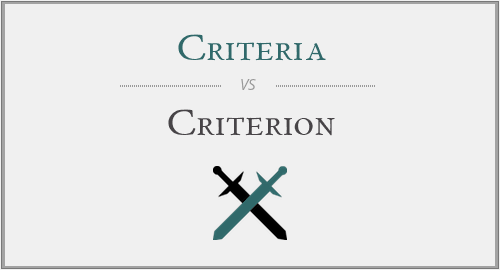Criteria” and “criterion” might be a pair of words that you rarely hear of, mainly because one is barely used, whereas the other is frequently used wrongly. If you believe that these words are synonyms, paronyms or different spellings of the same concept, then this article is definitely for you! Find out what the most usual confusions are, regarding “criteria” and “criterion”, and sort out what each word means and how it should be used correctly. We have prepared some clear explanations for you below!
Criteria vs. Criterion
An impressive mass of English users hasn’t even heard, or have slightly heard, about the word “criterion”. An even more impressive mass of people uses the word “criteria” instead of “criterion”, even when the context requires the other form. So what do these words represent?
While “criteria” is a commonly used concept with a meaning that you certainly know, you should know that this is actually the plural form of the word. If you thought it was a noun in singular, and that the plural was “criterias”, you couldn’t have been more wrong. “Criterias” does not exist, because “criteria” is the plural form of the word, and the spelling for the word in singular is no other than “criterion”. So these words are not paronyms and they are also not similar spellings of the same word. It is simply the same noun, with the singular form “criterion” and the plural form “criteria”.
When do we use “criteria”?
Unlike you might have expected, “criteria” is the plural form of the noun. So you should use it whenever referring to more than one “criterion”, more than one fact or quality level measured, considered or used when making a decision or a choice.
Example: What are the criteria that you used when you graded this test paper? – “criteria” is the plural form of the noun “criterion”.
When do we use “criterion”?
Less used because people replace it with its plural form, “criterion” is actually the form of the noun in singular referring to the fact or quality level measured, considered or used before or while making a choice or a decision.
Example: The main criterion for my choice was the grammatical correctitude of the text. – “criterion” is the singular form of the noun referring to the facts and quality levels considered for a decision.
Conclusion
The conclusion is simple and easy to remember. To sum and shorten everything up, “criteria” is the plural form of the noun and “criterion” is the spelling for the singular form. They simply refer to the same concept, in a situation where “criterion” is one of those nouns who don’t form plural by adding an “-s”, but by slightly changing its form, in this case into “criteria”.





Have a discussion about this article with the community:
Report Comment
We're doing our best to make sure our content is useful, accurate and safe.
If by any chance you spot an inappropriate comment while navigating through our website please use this form to let us know, and we'll take care of it shortly.
Attachment
You need to be logged in to favorite.
Log In